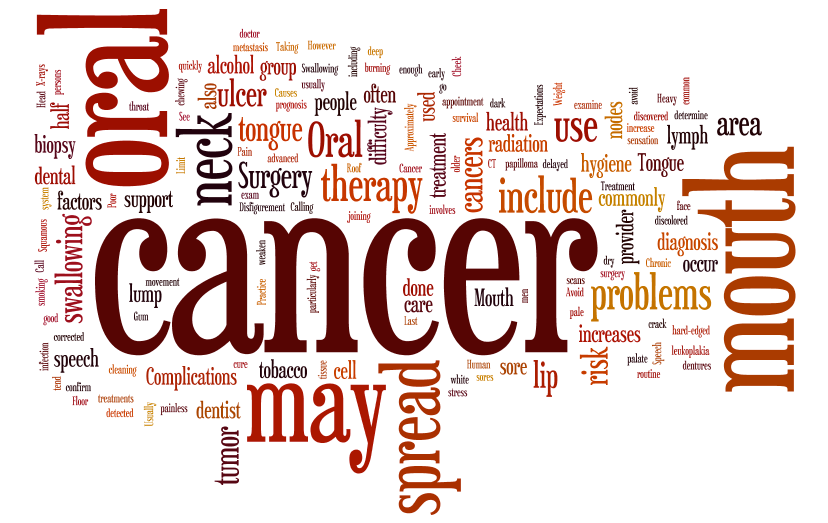
How Cancer Affects Your Mouth
According to the National Institute of Dental and Craniofacial Research, more than one-third of all cancer patients develop complications that affect the mouth. These mild to severe side effects can include mouth sores, infection, dry mouth, sensitive gums and jaw pain.
Cancer and its treatments, like chemotherapy, can weaken your immune system. If your mouth is not as healthy as possible prior to your cancer treatment, you may be more susceptible to infection. If the infection is serious enough, it can delay your cancer treatment. In addition, radiation therapy, especially in the area of the head and neck, can damage salivary glands which can cause dry mouth, a condition that increases your chances of tooth decay and infection.
Maintaining your mouth’s health before, during and after cancer treatment could help lesson some of the side effects and allow you to focus on your overall healing.
Taking Care of Your Teeth Before Treatment
Visit Your Dentist. Your dentist can evaluate your dental health and discuss which treatment options you should consider prior to starting cancer treatment. This could help reduce possible side effects associated with treatment. Some treatment options may include fluoride treatments to prevent cavities, filling existing cavities, treating gum disease, removing infected teeth, and restoring crowns or bridgework.
Brush Regularly. You should brush your teeth at least two times each day, making sure to brush before bed each night. You can soak your extra-soft toothbrush in warm water to make the bristles softer. Don’t forget to brush your tongue.
Don’t Use Tobacco. Tobacco products effect your oral health and could effect the ability for your body to heal.
Eat Nutritious Foods. Eating healthy foods rich with vitamins and nutrients can help boost your immune system. A healthy diet should include: fruits, vegetables, grains, low-fat or fat-free dairy, and protein such as lean beef, skinless poultry and fish. You may want to reduce eating citrus fruit or other high acid foods.
Rinse Your Mouth Often. This will help keep food and debris off of your teeth and gums and help reduce the chance of dental decay and infection. Avoid rinses with alcohol in them. Rinsing can also be helpful after vomiting to keep the acids from damaging the enamel on your teeth.
Taking Care of Your Teeth During Treatment
During the course of your cancer treatment you may experience mild to severe side effects. Be sure to consult with your cancer care team prior to dental checkups, especially if you have a port under your skin for receiving medication or feeding. This is important because patients with a port may also take anti-blood clotting medications, which can increase bleeding during dental and medical procedures and the risk of infection.
Below are some of the most common side effects and treatment options.
Mouth Sores. Mouth sores are ulcers that form in the soft tissue in and around your mouth including your tongue, gums or lips. They can be caused by chemotherapy or radiation and can be mild. Talk with your doctor or dentist about treatment options. Some recommendations may be topical treatments that may soothe and/or numb the sores in your mouth.
Dry Mouth. For patients undergoing cancer treatment, the use of certain medications, chemotherapy and radiation can greatly reduce the amount of saliva produced by directly affecting the salivary glands. Less saliva may increase your risk of tooth decay. Dry mouth can cause a constant sore throat, burning sensation, trouble speaking, difficulty swallowing and hoarseness or dry nasal passages. Be sure to visit your dentist regularly, brush your teeth and drink plenty of water. Ask your dentist if sugar-free candies or gum may be helpful for you.
Sensitive Gums. Sensitive gums may be a sign of minor tissue swelling from chemotherapy and radiation or a more serious indication of gum disease. Symptoms may include tenderness, bleeding, inflammation or even loose teeth. As some cancer treatments can weaken your immune system it can make your body more vulnerable to bacteria and infection.
Jaw Pain. Jaw or facial pain is a common side effect, especially if you have radiation therapy near your head or neck. Jaw and facial pain may include pain in or around the ear, tenderness of the jaw, pain when biting or headaches. If your jaw pain is attributed to tooth grinding and stress, talk to your dentist about treatment options. Simple jaw exercises may also be suggested.
Taking Care of Your Teeth After Treatment
After cancer treatment, you may find yourself experiencing some dental issues or simply needing a regular check-up. As you’re working toward your best health, don’t forget to take care of your mouth.
Here are some things to consider after completing treatment.
Visit your dentist regularly.
Brush your teeth twice a day with fluoride toothpaste; don’t forget to brush your tongue.
Rinse your mouth more often.
Avoid Tobacco
Eat Nutritious Foods
Leave a reply →